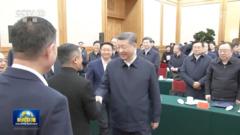China has announced a series of tariffs on U.S. imports in response to President Trump's trade policies, marking a significant, yet measured challenge against American tariffs. The Chinese government revealed plans to impose a 15% tariff on coal and liquefied natural gas and a 10% levy on crude oil, agricultural machinery, and large-engine cars from the U.S., effective February 10. This calculated move suggests that Beijing is keen on maintaining a balance; the tariffs are modest compared to Trump's wider 10% rate on all Chinese goods. Despite the retaliatory measures, both nations are still poised for discussions, with a phone call scheduled between the two leaders later this week.
China's Tactical Response to Trump's Tariffs Signals Ongoing Negotiation Opportunities

China's Tactical Response to Trump's Tariffs Signals Ongoing Negotiation Opportunities
As President Trump imposes new tariffs, China strategically unveils its own tariffs while keeping diplomatic channels open.
China's decision is one of selective response aimed at retaining some bargaining power without escalating tensions to a full-blown trade war. While the U.S. remains the largest exporter of liquid natural gas globally, China's import of these goods represents a small fraction of the total, reflecting a strategic targeting of impacted sectors to maximize leverage without crippling economic fallout. Observers note that both Xi and Trump are navigating a complex relationship marked by an initial diplomatic warmth that has been complicated by ongoing economic competition.
Historically, negotiations between the two nations have proven tumultuous. A previous agreement aimed at resolving trade deficits faced setbacks due to the pandemic, leaving unresolved tensions. Experts suggest that China will have to explore diverse retaliatory options beyond tariffs if Trump intensifies pressure. As the global business community watches this diplomatic chess game, the outcome of the upcoming talks could dictate future economic relations between the two largest economies in the world.
Historically, negotiations between the two nations have proven tumultuous. A previous agreement aimed at resolving trade deficits faced setbacks due to the pandemic, leaving unresolved tensions. Experts suggest that China will have to explore diverse retaliatory options beyond tariffs if Trump intensifies pressure. As the global business community watches this diplomatic chess game, the outcome of the upcoming talks could dictate future economic relations between the two largest economies in the world.





















